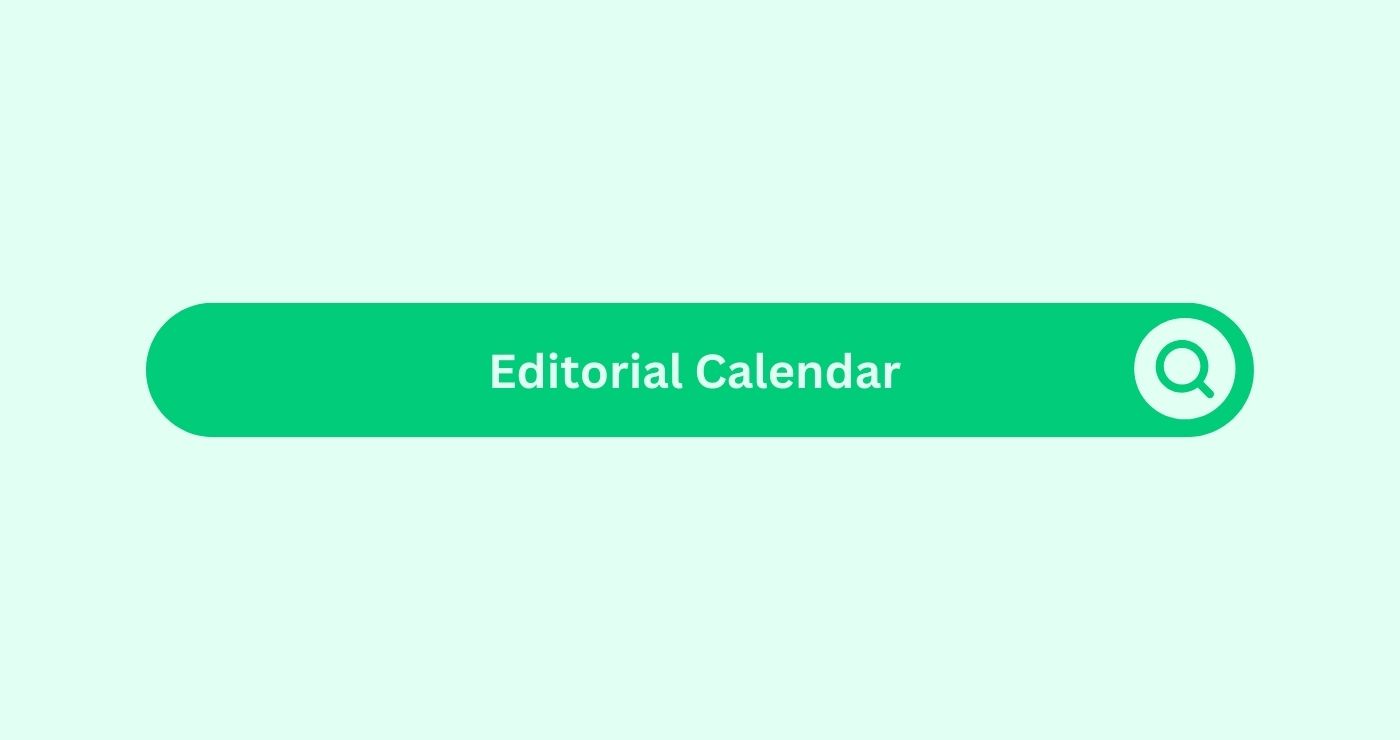Definition
Content creators, marketers, and SEO professionals use an Editorial Calendar as a strategic tool to plan, schedule, and manage the publication of their content. This calendar typically includes details such as publication dates, content topics, authors, keywordsWhat is the keyword in the context of content marketing? Key... More, and promotional strategies. The primary goal of an editorial calendar is to ensure a consistent and organized content flow that aligns with marketing objectives and audienceDefinition The term "Audience" refers to the group of indivi... More needs. By providing a visual representation of upcoming content, it helps teams coordinate efforts, track progress, and optimize the timing of their content releases to maximize engagementWhat is engagement in the context of content marketing? Enga... More and SEO impact.
How You Can Use Editorial Calendar
An Editorial Calendar can be used to streamline content creation and ensure that every piece of content aligns with the overall marketing strategy. For example, imagine a company specializing in eco-friendly products. They decide to use an editorial calendar to plan their blog content for the next quarter. Here’s how they might use it:
- Brainstorming and Topic Selection: The marketing team holds a brainstorming session and comes up with several content ideas, such as “Benefits of Using Eco-Friendly Cleaning Products,” “How to Reduce Plastic Waste,” and “Top 10 Sustainable Living Tips.”
- Keyword ResearchWhat is keyword research in the context of SEO? Keyword rese... More: They conduct keyword researchWhat is keyword research in the context of SEO? Keyword rese... More to identify high-traffic keywordsWhat is the keyword in the context of content marketing? Key... More related to these topics. KeywordsWhat is the keyword in the context of content marketing? Key... More like “eco-friendly cleaning,” “reduce plastic waste,” and “sustainable living tips” are selected.
- Content Planning: Each topic is assigned to a specific date on the editorial calendar. They decide to publish one blog post per week, ensuring a steady stream of content.
- Author Assignments: Writers are assigned to each topic, with deadlines set for draftsDefinition of E-Mail Drafts E Mail Drafts are saved versions... More, revisions, and final approvals.
- Promotion Strategies: The calendar also includes plans for promoting each blog post through social mediaWhat is Social Media? Social media refers to online platform... More, email newsletters, and collaboration with influencersDefinition Influencers are individuals with the power to aff... More.
By using an editorial calendar, the company ensures a consistent content output, strategically timed around relevant keywordsWhat is the keyword in the context of content marketing? Key... More and promotional opportunities, thereby enhancing their SEO performance and audienceDefinition The term "Audience" refers to the group of indivi... More engagementWhat is engagement in the context of content marketing? Enga... More.
Key Takeaways
- Organization: Keeps content creation and publication organized, reducing last-minute rushes and missed deadlines.
- Consistency: Ensures a steady stream of content, which is crucial for maintaining audienceDefinition The term "Audience" refers to the group of indivi... More interest and improving SEO rankings.
- Coordination: Facilitates better coordination among team members, from writers and editors to marketers and designers.
- Strategic Planning: Aligns content with marketing goalsIn the SEO space, "Goals" refer to specific, measurable obje... More, keyword strategies, and audienceDefinition The term "Audience" refers to the group of indivi... More needs, maximizing impact and effectiveness.
- Tracking and Analysis: Allows for tracking content performance over time, providing insights for future planning and optimization.
FAQs
What is an Editorial Calendar?
An Editorial Calendar is a tool used to plan, schedule, and manage content creation and publication, ensuring a consistent and strategic content flow.
Why is an Editorial Calendar important for SEO?
It helps maintain a regular publishing schedule, strategically align content with keywordsWhat is the keyword in the context of content marketing? Key... More, and organize promotional efforts, all of which contribute to better SEO performance.
How often should I update my Editorial Calendar?
It should be updated regularly, at least once a month, to reflect new content ideas, changing priorities, and performance insights.
Can an Editorial Calendar be used for social media content?
Yes, it can include social mediaWhat is Social Media? Social media refers to online platform... More posts, ensuring that your content is promoted effectively across all channelsDefinition Channels in the context of SEO refer to the vario... More.
What tools can I use to create an Editorial Calendar?
Common tools include Google Calendar, Trello, Asana, Co Schedule, and Excel spreadsheets.
How do I choose topics for my Editorial Calendar?
Topics should be chosen based on audienceDefinition The term "Audience" refers to the group of indivi... More interests, keyword researchWhat is keyword research in the context of SEO? Keyword rese... More, and alignment with your marketing goalsIn the SEO space, "Goals" refer to specific, measurable obje... More and seasonal trendsDefinition Seasonal trends in SEO refer to recurring pattern... More.
Who should have access to the Editorial Calendar?
All team members involved in content creation, editing, and marketing should have access to ensure smooth coordination and communication.
Can an Editorial Calendar help with content repurposing?
Yes, it helps you plan and track content repurposingDefinition Content repurposing involves taking existing cont... More, ensuring that valuable content is reused effectively across different platforms.
How detailed should my Editorial Calendar be?
The level of detail depends on your team's needs but should include essential information such as publication dates, topics, keywordsWhat is the keyword in the context of content marketing? Key... More, authors, and promotional plans.
How can I measure the effectiveness of my Editorial Calendar?
Track key metricsWhat are Metrics in the context of SEO? Metrics in SEO refer... More such as content performance, engagementWhat is engagement in the context of content marketing? Enga... More rates, SEO rankings, and audienceDefinition The term "Audience" refers to the group of indivi... More feedback to evaluate and optimize your editorial calendar.




